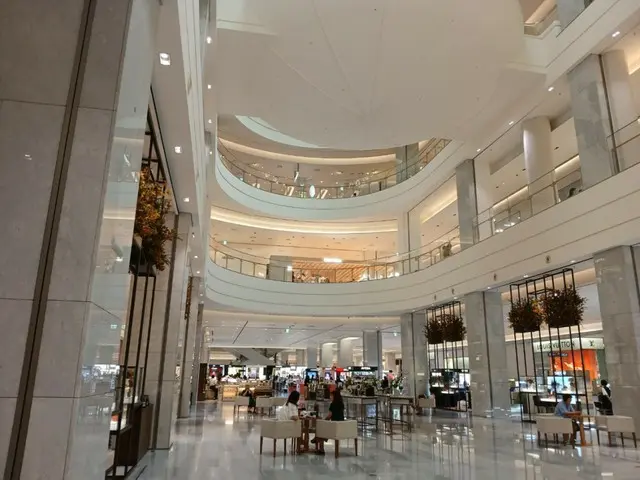This was the second highest number of days since records began, following 2016 (16.6 days). The extreme heat caused people to stay indoors, and tourism and other industries struggled to grow. Meanwhile, large shopping malls have been experiencing a surge in visitors this summer.
It is said that this has become an unexpected boom. The mall is bustling with customers who want to enjoy shopping in the cool, air-conditioned mall, and the Korean media has coined the phrase "mall-cans (vacation at the mall)."
This summer, South Korea had relatively few days of extreme heat in July, at 4.3 days, but in August, it has been extremely hot every day.
Since 2011, the company has been operating a "heatstroke emergency room monitoring system." The system involves 500 medical institutions nationwide that operate emergency rooms, working with public health centers and city and provincial disease control agencies to monitor the heatstroke cases of patients who visit the emergency room.
The system is designed to identify mild cases and monitor the impact of extreme heat on health. According to a statement from the agency, Yonhap News Agency, the system has been in operation since May 20th, when it was first put into operation this summer, and has been monitoring the number of cases since this month.
As of the 21st, a total of 3,019 people had been taken to hospitals with heatstroke. The total number of deaths believed to be due to heatstroke had risen to 28.
The number of tropical nights was the highest on record in the past. In South Korea, the heat has been so intense this summer that many people are refraining from outdoor activities such as swimming and marine sports, which is also affecting the tourism industry.
According to the JoongAng Ilbo newspaper, a manager of a guesthouse in Pyeongchang County, Gangwon Province, in the northeast, said dejectedly in an interview with the paper, "Business during the summer vacation season is bad."
A 32-year-old man who had planned to take a three-day, two-night trip to Gangwon Province with his wife at the end of July and beginning of August told the paper, "We decided it was too hot to go outside, so we called off our vacation."
"The special demand during the summer vacation season is expected to fall short of expectations, and concerns are growing over the prolonged slump in domestic demand," the paper said.
On the other hand, the record heat this summer has brought unexpected demand to some places, such as large shopping malls and department stores. The number of customers at The Hyundai Seoul in August increased by 22% compared to the same month last year.
%, and Hyundai Department Store Pangyo branch increased by 20.1%. Lotte Department Store and Shinsegae Department Store also saw an increase in the number of customers this month compared to the same month last year, with Jamsil Lotte World Mall also seeing an increase.
Approximately 3.5 million people visited the mall from the 1st to the 20th. Korean media E-Today reported that "the number of people visiting department stores and shopping malls in the cool weather is increasing.
According to the South Korean newspaper Hankyoreh, the Gwangju Institute of Science and Technology in Gwangju, southwest of the country, announced in July that the Korean Peninsula will experience a heatwave of scorching heat every year from the 2030s onwards.
Professor Yoon Jinho of the Department of Earth and Environmental Engineering at the university, together with a research team from Utah State University in the United States, came up with this prediction.
Temperatures fluctuate due to a variety of factors, but the research team believes that from the 2030s onwards, the effects of human-induced climate change will prevent temperatures from dropping below a certain level, making extreme heat the norm.
The heat has subsided somewhat this summer, but the Korea Meteorological Administration expects there will be days of extreme heat and tropical nights until early September. South Korea will celebrate its mid-autumn celebration (Chuseok) on the 17th of next month.
This year, the holiday can be extended to nine consecutive days by combining this day and the days before and after. It is expected that people will be able to go out more easily around this time, and according to the JoongAng Ilbo, many people who had planned to go out in July and August have been forced to cancel their trips due to the extreme heat.
The man, who said he had given up on the trip, told the paper, "I'm planning to take my annual leave around the mid-autumn celebration and travel."
2024/08/30 14:55 KST
Copyrights(C)wowkorea.jp 5

